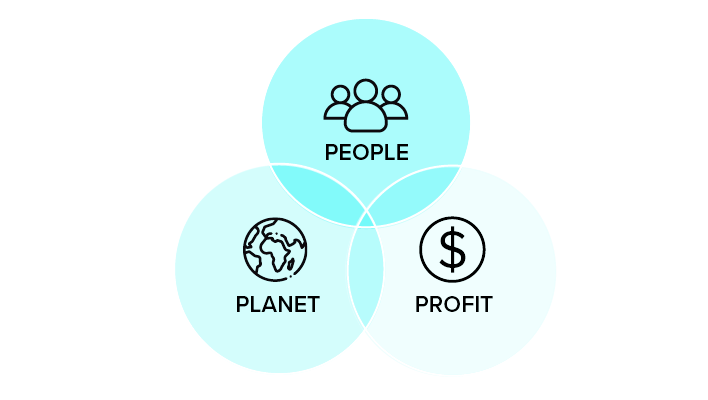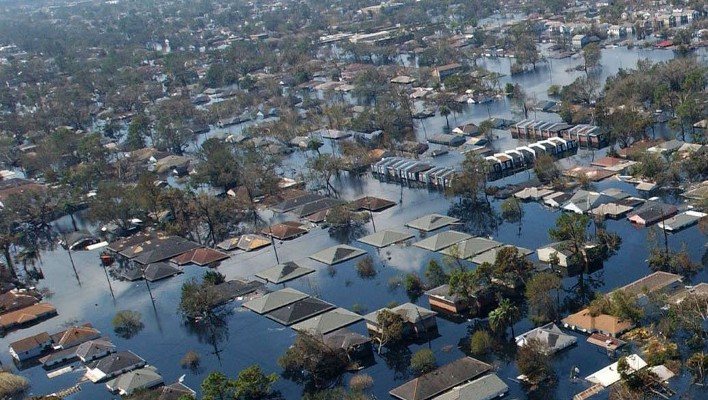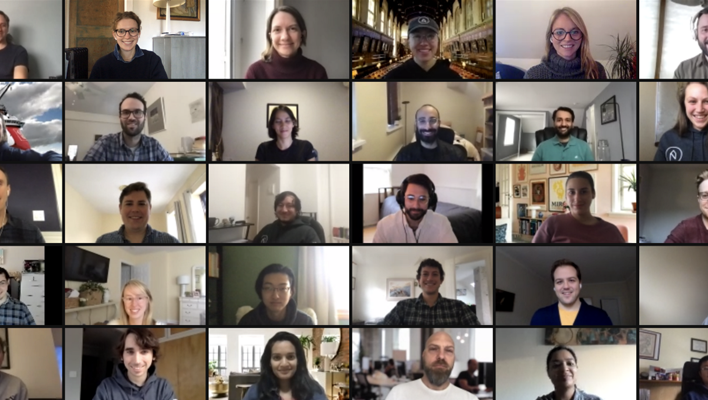
We are faced with tens of thousands of choices each day — and with over a third of our adult life spent working, the job that we choose is one of the most consequential. The turmoil of 2020 has brought this consideration into even starker relief: making our way through pandemic, social unrest, and recession has also meant questioning many of the assumptions we’ve held about ourselves, our society, and our lives. As each of us considers what’s most important to us and the change we want to see in the world, there has never been a more important moment in history for the triple bottom line (TBL) business. And the principles behind triple-bottom line business have never been more important for the world.

Profit, People, and Planet
These businesses, in whatever industry they operate, aim to maximize returns across three connected vectors: profit, people, and planet. At its core, TBL simply means this: businesses should focus on — and be judged upon — their net-impact on the world. While the primary motivation of all for-profit companies will always be shareholder return, that shouldn’t be the only consideration. And if companies work toward goals that generate positive results across financial return, social good, and environmental outcomes, then that builds profit-driven businesses that do well by doing good in a market economy.
I’ve been drawn to triple bottom line businesses since being introduced to the concept in business school. When I became an IBMer in 2011, I joined a firm that had a well-publicized, singular company objective — an earnings per share target — that acted as the sole north star for the business, both internally and externally. This was deeply uninspirational, and missed the mark for every important stakeholder — customers, employees, and Wall Street. That experience spurred me toward finding high-growth opportunities to deploy advanced technology and solve real problems, while having more than a myopic focus on that traditional single bottom line.
Today, I’m deeply fortunate to build a company at Nautilus that is predicated on the triple bottom line concept. Particularly in today’s social, economic, and environmental climate, it means so much to turn back toward this principle as a north star. As we deliver economic value for our clients, the result is ultimately fewer greenhouse gas (GHG) emissions for everyone — and Nautilus does our part to solve the climate crisis. Every task we tackle each day moves us one step closer to that TBL ideal: a business that produces massive wins for our clients, shareholders, and the global community we are all a part of.
“Businesses are in business to make money.”
Yes, and — of course the almighty dollar is at the core of what we do every day. If we don’t generate revenue growth and eventually produce a profit, then our business makes no sense to investors, who place major bets on our economic success. If we don’t generate a monetary return for our clients, then there is no motivation for them to continue to adopt our platform. And perhaps most succinctly — if we can’t associate a dollar value of ROI to the use of our platform, then an easy conclusion anyone can draw is that it just doesn’t matter in the market.

But TBL isn’t about saying that the profit motive matters any less — it is about employing the profit imperative to drive broader outcomes beyond earning that dollar, outcomes that drive positive fundamental change in the world. At Nautilus, we believe that reducing human-made greenhouse gas emissions is essential to the future of life on Earth. We also believe that ocean shipping is essential to the future of humanity and global trade. So what we focus on each day is figuring out the path to navigate both our industry and our world toward the future we believe in — one where ocean shipping is the foundation of carbon-free global commerce.
In order to get there, we focus on the dollars. Internally, this means we track all of your favorite three letter acronyms — ARR, LTV, CAC, GPM, etc. — and seek to deeply understand the economic performance of our business to inform our strategy. Externally, this means that our entire value proposition, product, and go-to-market strategy is predicated upon delivering a software platform of high and increasing value to savvy buyers who are laser-focused on their ROI. The connection to our mission comes naturally: the lower we can drive fuel consumption for our clients, the higher the return on their investment in our software, the greater the value of our enterprise — and the longer-lasting our impact on the environment.
We can focus on our greatest generational challenge: climate change.
Our point of view on global warming is crystal clear: human activity produces greenhouse gases, greenhouse gases contribute to global warming, and global warming is transforming Earth in a way that makes it less and less habitable for humanity. This change is happening so quickly that it requires significant collective action today in order to keep the planet safe for future generations. If we don’t find a way to drive this change — and if we don’t leverage profit-driven motivation as the fastest way to get there — then the outcome is dire for us all.
And the outcome is disproportionately dire for those who are already marginalized. No matter which way you slice the data demographically, there is one simple truth: global warming compounds social inequality within and across countries. People who are already systematically disadvantaged are more likely to be exposed to the impact of climate change. Once exposed, they are more likely to be susceptible to damage caused by climate change. And as they are hurt, they are less likely to be able to cope with and recover from that damage. The reality is that the burden of climate change is inequitable, as wealthier individuals and nations are able to ignore the impact, or simply adjust their lifestyles to accommodate it.

While we find these facts to be evident in the data, it also is true that for anyone buying Nautilus, they can be on either side of climate science. Our business is focused on delivering real economic return, and if a prospective client believes that running a competitively advantaged business is important, then they will also believe our software is important. And that’s part of the beauty of TBL. Rather than arguing about the merits of climate science, we can focus on delivering bottom line business value — and the net impact to the world of reduced GHG emissions still derives from our work.
Mission-driven and results-oriented.
That has always been what makes TBL businesses so elegant in principle — the perfect alignment between net impact, economic return, and environmental outcome. When we all seem to be subjected each day to strife, calamity, and deep uncertainty, the desire for a sense of purpose is ever greater, and we yearn to see a more meaningful and durable impact from that third of our lives we spend working. As we wrangle with major existential questions about what role we can have in course-correcting society, being able to stay connected to the triple bottom line has never been more consequential.

Moreover as we rebuild the global economy, this can be true across the business landscape. Whether it’s in organizations structured from the ground up as triple bottom line, or in established firms just now considering what it means to explore CSR or issue their first ESG report, more businesses can and should embrace a simple reality: we have to fundamentally transform the way we operate as humans, and private industry must play a leading role in that transformation. The only way to do that is to stay focused — yes, on profit and shareholder return — and also on the world we leave in our wake, the one that we steward for future generations. Now is the moment for the triple bottom line.
By Matt Heider, CEO at Nautilus Labs, on Medium